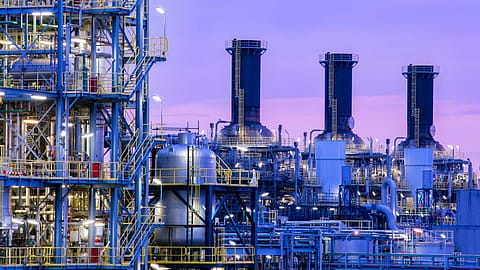NITI Aayog charts roadmap for India's chemical sector to reach $1 trillion by 2040
India's chemical sector, currently facing a $31 billion trade deficit, has the potential to become a $1 trillion industry by 2040, according to NITI Aayog. The report suggests strategic interventions, including developing chemical hubs and enhancing port infrastructure, to boost R&D and global competitiveness.

India’s chemical sector, currently accounting for just 3.5% of global value chains and facing a $31 billion trade deficit, has the potential to become a $1 trillion industry by 2040. A new report by government think tank NITI Aayog charts an ambitious course for India to become a global chemical manufacturing powerhouse by creating world-class chemical hubs and improving port infrastructure to fast-track clearances, and boost R&D.
The report, "Chemical Industry: Powering India’s Participation in Global Value Chains," offers an extensive analysis of India’s chemical sector, highlighting both opportunities and challenges.
India’s chemical sector, while significant in size and GDP contribution, remains fragmented and constrained by infrastructure gaps, regulatory inefficiencies, and low R&D intensity. "India’s 3.5% share in global chemical value chains and its chemical trade deficit at $31 billion in 2023 underscore its high dependence on imported feedstock and specialty chemicals. However, with targeted reforms encompassing a comprehensive range of fiscal and non-fiscal interventions, India will be able to achieve a $1 trillion chemical sector and a 12% GVC share by 2040," the report says.
The NITI Aayog report envisions India as a global chemical manufacturing powerhouse by 2030, with a 5%-6% share of the global chemical value chain. "The sector aims to double its current production levels and reduce the trade deficit significantly from USD 31 billion in 2023 to reach a net-zero trade balance in chemicals. The initiative will generate an additional export of USD 35-40 billion, creating around 7 lakh skilled jobs."
Challenges Facing the Chemical Sector
India’s chemical sector faces several structural challenges that constrain its global competitiveness. A key issue is the country’s heavy reliance on imported feedstock, stemming from limited domestic backwards integration. Infrastructure gaps, outdated industrial clusters, and high logistics costs have created a cost disadvantage compared to global peers. Compounding this, India’s low investment in R&D, with only 0.7% of investment against the global average of 2.3%, hampers indigenous innovation in high-value chemicals. Regulatory delays, especially in environmental clearances, further stifle industrial agility. The report says the sector is also hampered by a 30% shortfall in skilled professionals, particularly in emerging areas such as green chemistry, nanotechnology, and process safety.
NITI Aayog’s Roadmap for the Industry
Recommended Stories
NITI Aayog’s report outlines several strategic fiscal and non-fiscal interventions aimed at enhancing India’s global competitiveness in the chemical sector. It calls for the establishment of world-class chemical hubs in India through revamping existing clusters and developing new ones. The report says India needs to develop existing port infrastructure by forming a chemical committee for ports to advise on and address infrastructural gaps in chemical trading at ports, and develop 8 high-potential clusters.
The think tank has proposed to incentivise incremental production of chemicals based on import bill, export potential, single-source country dependence, end-market criticality, etc., and the disbursement of R&D funds to drive innovation with enhanced collaboration between industry and academia through the creation of an interface agency. It has also proposed to simplify and fast-track the environmental clearance process by setting up an audit committee.
The think tank believes that moving forward, India could negotiate FTAs that incorporate specific provisions for the chemicals industry. "This can include incorporating industry-focused protections such as tariff quotas or selective duty exemptions on critical raw materials and petrochemical feedstocks...raising FTA awareness, simplifying procedures, and easing origin proofs can help more exporters access benefits and boost competitiveness."
As per NITI Aayog, there is a need for talent and skill upgradation in the chemical industry, which can be done by expanding ITIs and specialised training institutes, upgrading faculty and teacher training, and building on industry-academia partnerships.
(INR CR)